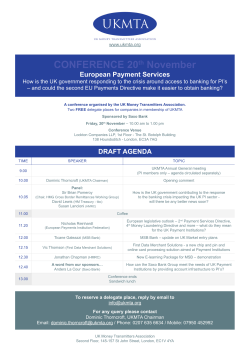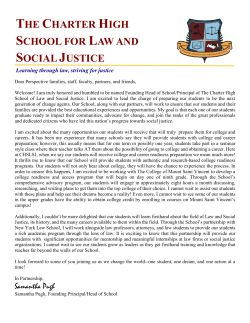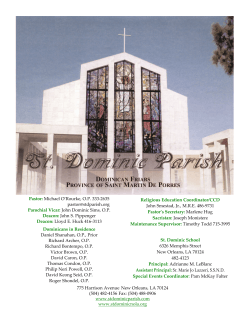
Canadian Professional Responsibility
Federation of Law Societies of Canada National Committee on Accreditation SAMPLE Examination for Canadian Professional Responsibility Candidate No.: _______________ (To ensure your anonymity, please do not print or sign your name) For educational purposes only. This document may not be reproduced or distributed in whole or in part without the prior written permission of the Federation of Law Societies of Canada. Aux fins de formation personnelle seulement. Ce document ne peut être reproduit ou distribué en totalité ou en partie sans la permission écrite préalable de la Fédération des ordres professionels de juristes du Canada. © 2014 Federation of Law Societies of Canada. All Rights Reserved. © 2014 Fédération des ordres professionnels de juristes du Canada. Tous droits réservés. Federation of Law Societies of Canada National Committee on Accreditation SAMPLE Examination for Professional Responsibility General conditions of the exam: This is a three (3) hour, open book exam. Answers should be double-spaced and written in blue or black ink (no pencils). All answers must be completed on the pads provided, except where space is provided. The examination will be graded on a pass/fail basis (50% is a pass). WRITE LEGIBLY. Writing considered illegible by the examiner may result in your exam not being fully graded or your exam being disqualified. You must return the exam questions in the envelope provided along with your answers. Failure to return the questions will result in the automatic disqualification of your exam. The contents of the examination, including the exam questions, must not be disclosed or discussed with others. Instructions specific to this exam: 1. Each exam may have its own special instructions therefore it is important for you to read these carefully before starting. 2. These sample exams are simply indications of the style/types of questions which may be asked in each exam; they do not reflect the content or actual format/structure of questions nor of their value. 3. Actual exams vary from subject to subject and from exam session to exam session. SAMPLE Examination for Professional Responsibility 2 Federation of Law Societies of Canada National Committee on Accreditation FACT PATTERN: “PASTELS AND PRINTS” On Monday morning, Samantha Jones called Dominic Gonzales, a lawyer with a general practice. Samantha told Dominic that she and her business partner – Tim Rogers – are looking to sell their jointly-owned art gallery: “Pastels and Prints”. Samantha and Tim plan to divide up the sale price of the gallery (a downtown commercial property) and whatever money they receive on the sale of the remaining merchandise that they currently have in stock. Samantha hopes that the sale proceeds and inventory profits should be in the range of (total) $500,000. Samantha has known Tim for years. Until now, the business relationship between them has been great. However, after they decided to sell Pastels and Prints, things have been difficult. Last Friday, during negotiations between Samantha and Tim regarding how to divide up the proceeds of the sale of the business, things broke down totally. Tim stormed out of the meeting room at the gallery and Samantha has not spoken with him since. Even though communications are tough at the moment, she tells Dominic that she still cares for and trusts Tim. She would rather not lose him as a friend. Samantha also tells Dominic that – other than the money that is tied up in their business – Tim does not have a lot of financial resources. Further, Tim and his spouse are leaving the country soon (to take up work in a small community in Mexico that is famous for its paintings and galleries). She is certain, therefore, that he will return shortly looking to finalize the sale, which he would like to make happen as soon as possible before he needs to leave the country. Samantha asks Dominic if he would act as her lawyer in her negotiations with Tim regarding the sale of Pastels and Prints. Dominic agrees. Please turn to the next page for the start of the examination questions. SAMPLE Examination for Professional Responsibility 3 Federation of Law Societies of Canada National Committee on Accreditation QUESTION ONE (Value: 20 MARKS) Samantha is feeling badly for Tim (particularly about his financial situation). She knows that it will be difficult for him to hire a lawyer. She asks Dominic if it would be possible for Dominic to act as a lawyer for both Samantha and Tim, and if so, whether Dominic would be willing to do so. What should Dominic say? Specifically, discuss whether it would be possible for Dominic to act for both Samantha and Tim in the negotiations between Samantha and Tim regarding the Pastels and Prints deal. If so, how and under what conditions? If not, why not? Be specific about what factors – precedent, Canadian Bar Association Code of Professional Conduct provisions, etc. – should inform Dominic’s thinking. QUESTION TWO (Value: 20 MARKS) Assume for purposes of this question that Dominic decides only to act for Samantha and that Tim has not retained a lawyer. Further, Dominic is informed by Samantha that the relationship between Samantha and Tim has now totally broken down. Samantha instructs Dominic simply to “get the deal done.” When asked if she wants input into how the deal is done or on what terms, she simply replies: “Be as tough on Tim as possible and get the best deal you can. I don’t care if he gets anything when you’re through with him.” Dominic prides himself on being a fair and ethical lawyer. He does not like to take advantage of people, particularly if they are not represented by a lawyer. However, he also knows that he has a duty to act in the best interests of his client. How should Dominic proceed in this circumstance? What and/or whose considerations/interests are at stake and how should they be balanced and/or resolved? QUESTION THREE (Value: 20 MARKS) Assume for purposes of this question that negotiations have now failed and that the parties have proceeded with litigation. The case has advanced though the pleadings stage and is now at the discovery stage. Dominic advises Samantha that she must essentially disclose all documents that are relevant to the litigation. He also advises Samantha that some of her documents may be subject to “privilege” exceptions. Samantha collects the documents that she has for production. When she provides the documents to Dominic, she holds one document back. It is a memo marked “confidential” that she wrote to herself just before she and Tim decided to sell the business. The memo sets out what she thought the business would be worth in a sale situation (which she listed – in the memo – as much lower than what she has claimed in the litigation between her and Tim). She points out to Dominic that she specifically marked the document “confidential” at the time that she wrote it and therefore feels that she should not have to produce it. Discuss what Dominic should say – and on what basis – to Samantha about the difference between “confidential” and “privilege” and her production obligations regarding the memo. SAMPLE Examination for Professional Responsibility 4 Federation of Law Societies of Canada National Committee on Accreditation QUESTION FOUR (Value: 20 MARKS) Following the discovery stage of the litigation but before trial, Samantha asks Dominic to revisit with her how she can pay for his legal services, including whether he would do some of the work for free, or at least at a reduced rate. How should he respond? Based on what individual (i.e. relating to this client and this case) and what systemic (i.e. relating to the profession and/or society generally) considerations? QUESTION FIVE (Value: 20 MARKS) With at least one specific reference to the Pastels and Prints fact pattern and at least two specific references to the Canadian Bar Association’s Code of Professional Conduct, discuss your view of what the profession of law is and how, if at all, it differs from other business activities. End of Examination SAMPLE Examination for Professional Responsibility 5 World Exchange Plaza • 1810 - 45 rue O’Connor Street • Ottawa • ON • K1P 1A4 Tel/Tél: (613) 236-1700 • Fax/Téléc: (613) 236-7233 • www.flsc.ca
© Copyright 2025









